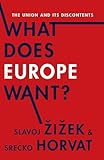What Does Europe Want? : The Union and Its Discontents / Srećko Horvat, Slavoj Žižek.
Material type: TextSeries: Insurrections: Critical Studies in Religion, Politics, and CulturePublisher: New York, NY : Columbia University Press, [2014]Copyright date: ©2014Description: 1 online resource (240 p.)Content type:
TextSeries: Insurrections: Critical Studies in Religion, Politics, and CulturePublisher: New York, NY : Columbia University Press, [2014]Copyright date: ©2014Description: 1 online resource (240 p.)Content type: - 9780231171076
- 9780231538411
- Civil rights -- European Union countries
- Civil rights; European Union countries
- Equality before the law -- European Union countries
- Equality before the law; European Union countries
- Representative government and representation -- European Union countries
- Representative government and representation; European Union countries
- PHILOSOPHY / Political
- 327.4 23
- JN30
- online - DeGruyter
| Item type | Current library | Call number | URL | Status | Notes | Barcode | |
|---|---|---|---|---|---|---|---|
 eBook
eBook
|
Biblioteca "Angelicum" Pont. Univ. S.Tommaso d'Aquino Nuvola online | online - DeGruyter (Browse shelf(Opens below)) | Online access | Not for loan (Accesso limitato) | Accesso per gli utenti autorizzati / Access for authorized users | (dgr)9780231538411 |
Frontmatter -- Contents -- Foreword. The Destruction of Greece as a Model for All of Europe: Is this the Future that Europe Deserves? -- Preface. What Does the U.S. Want, or What to Do After Occupy? -- 1. Breaking Our Eggs without the Omelette, from Cyprus to Greece. -- 2. Danke Deutschland! -- 3. When the Blind Are Leading the Blind, Democracy Is the Victim -- 4. Why the EU Needs Croatia More than Croatia Needs the EU -- 5. What Does Europe Want? -- 6. Are the Nazis Living on the Moon? -- 7. The Return of the Christian-conservative Revolution -- 8. In the Land of Blood and Money: Angelina Jolie and the Balkans -- 9. The Turkish March -- 10. War and Peace in Europe: ‘Bei den Sorglosen’ -- 11. Save Us from the Saviours: Europe and the Greeks -- 12. ‘I’m Not Racist, but … The Blacks are Coming!’ -- 13. Shoplifters of the World Unite -- 14. Do Markets Have Feelings? -- 15. The Courage to Cancel the Debt -- 16. The Easiest Way to the Gulag Is to Joke About the Gulag -- 17. We Need a Margaret Thatcher of the Left -- 18. Europe Will Be Either Democratic and Social or It Will No Longer Exist (interview) -- 19. ‘The Role of the European Left’ (debate) -- Afterword. Europe Is Dead, Long Live Europe! -- Notes
restricted access online access with authorization star
http://purl.org/coar/access_right/c_16ec
Slavoj iek and Srecko Horvat combine their critical clout to emphasize the dangers of ignoring Europe's growing wealth gap and the parallel rise in right-wing nationalism, which is directly tied to the fallout from the ongoing financial crisis and its prescription of imposed austerity. To general observers, the European Union's economic woes appear to be its greatest problem, but the real peril is an ongoing ideological–political crisis that threatens an era of instability and reactionary brutality. The fall of communism in 1989 seemed to end the leftist program of universal emancipation. However, nearly a quarter of a century later, the European Union has failed to produce any coherent vision that can mobilize people to action. Until recently, the only ideology receptive to European workers has been the nationalist call to "defend" against immigrant integration. Today, Europe is focused on regulating the development of capitalism and promoting a reactionary conception of its cultural heritage. Yet staying these courses, iek and Horvat show, only strips Europe of its power and stifles its political ingenuity. The best hope is for Europe to revive and defend its legacy of universal egalitarianism, which benefits all parties by preserving the promise of equal representation.
Mode of access: Internet via World Wide Web.
In English.
Description based on online resource; title from PDF title page (publisher's Web site, viewed 03. Jan 2023)


